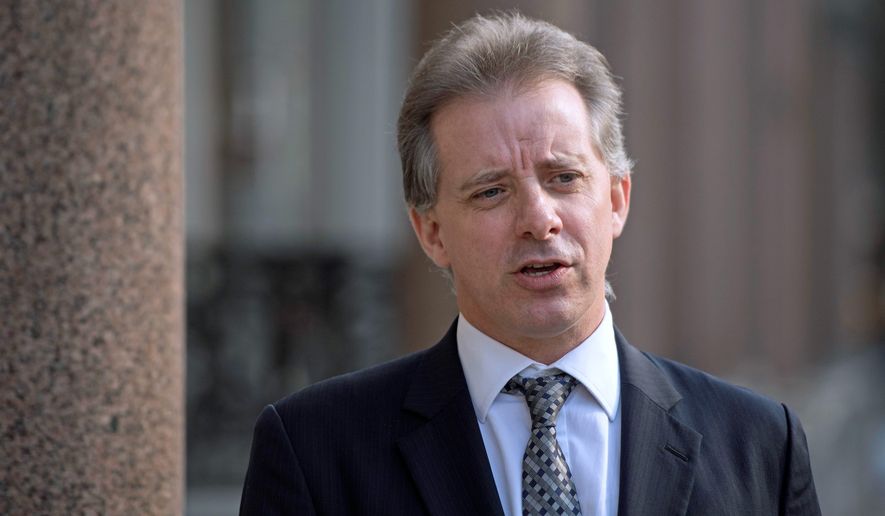Three Russian oligarchs are targeting the Christopher Steele dossier with new evidence they say shows the British ex-spy displayed “recklessness” in accusing them.
In April 2018, Mikhail Fridman, Petr Aven and German Khan filed a defamation lawsuit against Mr. Steele in D.C. Superior Court.
The chief investors of Alfa Bank, Russian’s largest commercial bank, claimed that Mr. Steele falsely accused them of corruption over their close ties to Russian President Vladimir Putin. Mr. Steele also accused them of being involved in the Russian government’s illegal interference in the 2016 election through computer hacking and social media warfare.
The trio saw Judge Anthony C. Epstein toss the case four months later. The judge ruled that the executives, among the billionaire class that dominates Russia’s business landscape, are public figures. They failed to show that Mr. Steele exhibited the legally required “actual malice,” or disregard for the truth, to win a U.S. libel case.
Alan S. Lewis of the New York law firm Carter Ledyard & Milburn appealed to the D.C. Court of Appeals.
Then a new development materialized. Justice Department Inspector General Michael E. Horowitz released his 478-page report on how the FBI handled Mr. Steele’s dossier, which was funded by the Hillary Clinton presidential campaign and the Democratic National Committee.
Mr. Lewis argues the IG report gives them the evidence they need to prove “actual malice” in the lower court.
Mr. Horowitz disclosed the shaky grounds on which Mr. Steele based his allegations of a wide conspiracy between the Trump campaign and Kremlin. His key Russian source told the FBI that he had informed Mr. Steele that his claims were basically gossip, not confirmed, the Horowitz report said.
With that, Mr. Lewis filed a new motion. He wants the appeals court to incorporate the IG report into the case file and order the lawsuit reinstated. Another option would be to remand the case to the lower court to see if the Horowitz report convinces the judge there was “actual malice.”
The report’s findings, the motion says, “show Steele’s bias and recklessness because he took what was essentially gossip of uncertain origin, and then, after manipulating that hearsay information, portrayed it in his report as proven fact.”
Mr. Lewis said there were “doubts that would have been obvious to Steele if he had not willfully blinded himself to such doubts.”
“Specifically, the IG Report now reveals that Defendants not only knew that all of their reports were based on anonymous, uncorroborated allegations, which makes Defendants’ publication of such allegations at least arguably reckless, but worse still, that Defendants misstated and falsely presented those allegations as documented facts,” the attorney said.
The three bankers say they were libeled in Mr. Steele’s report No. 112, one of 17 memos that comprised his 35-page dossier.
The Sept. 14, 2016, memo states: “Russia/US Presidential Election: Kremlin- Alpha [sic] Group Co-Operation.”
The Alfa executives maintain there was no such cooperation.
The memo contains four paragraphs that accuse them of a corrupt relationship with Mr. Putin. No information touched on the Trump campaign or election interference.
The official report by former special counsel Robert Mueller mentions Alfa Bank but does not accuse the bankers of wrongdoing. Instead, the report narrates a thread in the three-month Trump transition.
Mr. Aven provided the Mueller team with a peek inside the world of Mr. Putin and his oligarchs. Mr. Aven said he is one of about 50 wealthy Russian businessmen who regularly meet with the president.
“Aven said that he took these meetings seriously and understood that any suggestions or critiques that Putin made during these meetings were implicit directives, and that there would be consequences for Aven if he did not follow through,” the Mueller report said.
The two met during the Trump transition to discuss whether the new administration would impose more economic sanctions. Mr. Aven said they didn’t discuss election interference.
Most telling, perhaps, is that Mr. Putin told Mr. Aven he had no contacts among Trump associates — a statement that, if true, would dispel the notion from Trump critics that he had Kremlin ties.
Subsequently Mr. Putin summoned an “all-hands” meeting of oligarchs in December 2016 to discuss ways to reach the transition. Mr. Aven had no luck. In early 2017, the FBI subpoenaed him as a witness.
Alfa Bank also was the center of an inaccurate allegation floated by Fusion GPS, the D.C. opposition research firm that handled Mr. Steele and spread the dossier around Washington.
Fusion co-founder Glenn Simpson pushed the claim that Alfa maintained a dedicated computer server with the Trump Organization. Alfa server stories appeared in at least two publications, Slate.com and The New Yorker.
The Trump and Alfa sides always denied this. The Horowitz report said the FBI in early 2017 concluded the server didn’t exist.
Alfa’s partners also are suing Fusion in U.S. District Court in the District of Columbia for defamation.
Alfa marks the fourth Trump-Russia target to cite the Dec. 9 Horowitz report as a way to bolster a pending court case.
Retired Army Lt. Gen. Michael Flynn included the IG findings in a new court filing to show FBI abuse when agents put him under investigation in August 2016.
Former Trump campaign adviser Carter Page cited the IG report as evidence of exoneration in a defamation lawsuit he filed against the Democratic National Committee.
Russian entrepreneur Aleksej Gubarev wants an appeals court record to include the report in his libel lawsuit against BuzzFeed, which published the dossier.
• Rowan Scarborough can be reached at rscarborough@washingtontimes.com.




Please read our comment policy before commenting.